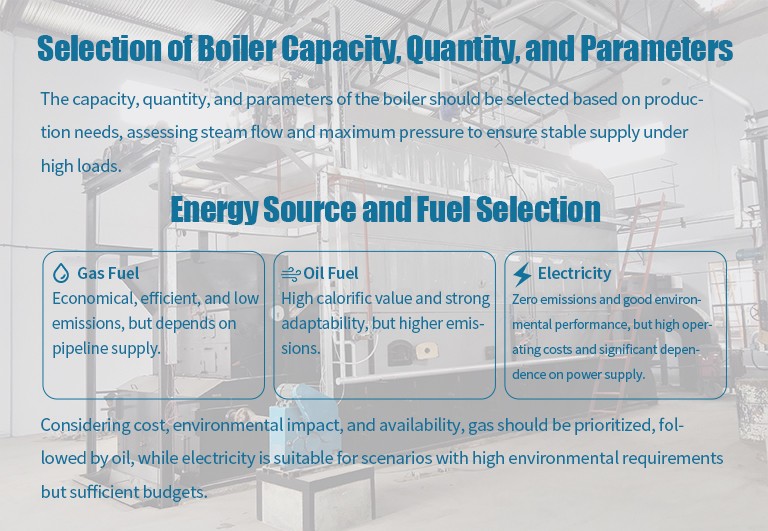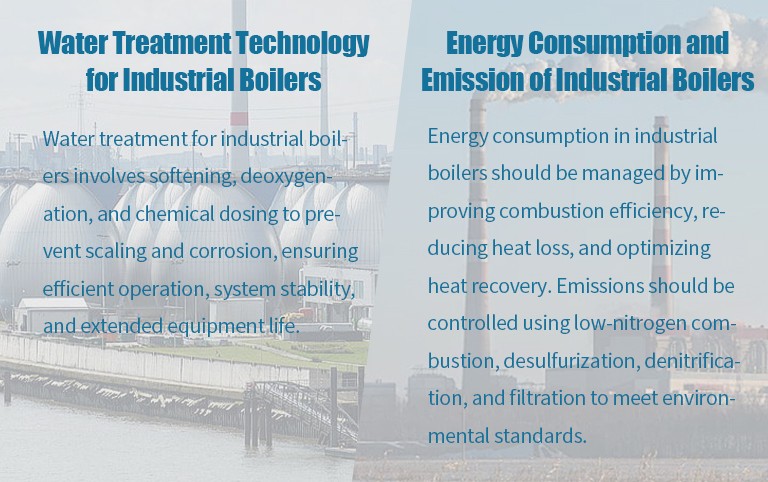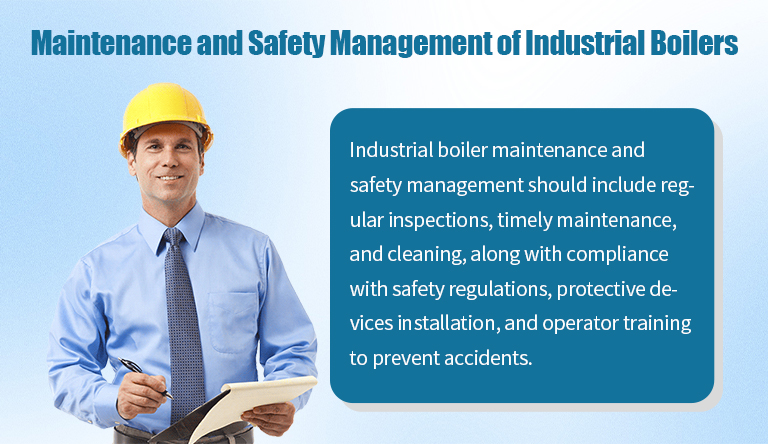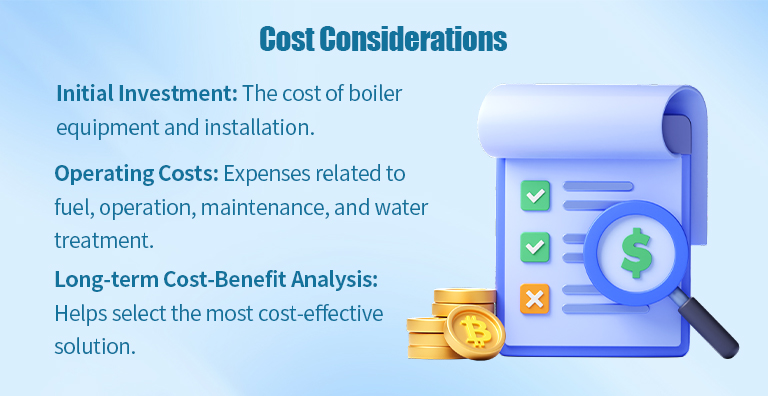In modern industrial production, boilers are essential for energy supply, impacting production efficiency, product quality, and operating costs. Industries like chemical, pharmaceutical, food processing, textile, and paper rely on boilers for heating and steam. Selecting the right boiler ensures smooth production, lowers operating costs, reduces emissions, and supports sustainable development.
However, in the face of many types of industrial boilers, enterprises need to choose accurately according to production requirements. This requires not only a deep understanding of steam or hot water demand, but also comprehensive consideration of boiler type, capacity, energy source, water treatment technology, energy consumption and emissions. The operation and maintenance of boilers directly affect safety management and long-term cost-effectiveness, and improper selection may lead to high operating costs or production risks.
To help enterprises stay competitive, EPCB boilers offers comprehensive industrial boiler selection guidelines. Whether building a new factory or upgrading an existing system, these guidelines provide valuable insights to ensure your choice meets production needs while achieving economic and environmental goals.
Analyze Requirements and Determine Parameters
Before choosing an industrial boiler, it is a crucial step to deeply analyze the demand for steam and hot water in the production process. This link is not only the basis of boiler selection, but also the key to ensure that the boiler system can operate efficiently and meet the technological requirements. By analyzing and defining the parameters scientifically, the operation efficiency of the boiler can be optimized, the energy consumption can be reduced and the stability of the system can be ensured.

Temperature requirements
Different processes have varying temperature requirements. Before selecting a boiler, specify the minimum and maximum temperatures needed to ensure the boiler meets these demands. Additionally, some processes require constant temperature, while others need rapid heating or cooling. Understanding these needs helps in choosing a boiler with quick response or temperature control, optimizing production.
Pressure demand
According to different industrial application scenarios, the pressure required by the boiler will be different:
For heating, food processing, and washing, medium and low-pressure steam suffices, allowing for simpler, cost-effective boiler designs.
In heavy industries like power plants, chemical processing, and metalwork, high-pressure steam is essential for driving turbines and reactions, requiring boilers with high pressure resistance to ensure system safety and production continuity.
Flow demand
Flow rate is one of the core factors that determine boiler selection, which is directly related to the supply capacity of steam or hot water. When defining the flow demand, it is necessary to know the maximum instantaneous demand of steam or hot water in the production process. Boiler selection should be based on this to ensure that the boiler can meet the supply requirements under high load and will not affect the production efficiency.
Selection of Boiler Type
In industrial production, it is very important to choose a suitable boiler type. Different types of boilers have their own characteristics in design, structure and application scenarios. According to production requirements, reasonable selection can not only improve production efficiency, but also optimize operating costs and reduce emissions. The following is a detailed introduction of the main types of industrial boilers and their applicable scenarios.
Fire tube steam boiler
Fire-tube steam boilers are commonly used in low-pressure applications for heating, food processing, washing, paper making, and other industries, supplying steam or hot water. Their principle involves transferring heat to water through fire tubes to produce steam or hot water.
Advantages: simple structure, small floor space and stable operation.
Limitations: Because of its design characteristics, the fire tube boiler is not suitable for occasions with high pressure and large-scale steam demand, and the response speed is slow when the load changes greatly.
Water tube steam boiler
Water-tube steam boilers are widely used in power plants, chemical, oil refining, pharmaceutical, and steel industries requiring high-pressure steam. They are ideal for high-pressure, large-scale applications, with water in pipes absorbing combustion heat to produce steam, allowing them to withstand higher pressures and temperatures.
Advantages: high efficiency and output, high safety and strong adaptability.
Limitations: The structure of water-tube boiler is complex, the installation and maintenance costs are high, and it occupies a large area, so it is suitable for large-scale industrial occasions and not suitable for small-scale production or enterprises with limited space.
Read More:The Differences Between Industrial Fire Tube Boiler & Water Tube Boiler
Due to stricter environmental regulations, industrial electric steam boilers are now favored in industries requiring zero emissions and no noise, such as pharmaceuticals, food processing, labs, and hospitals. They use electric heating elements to produce steam, making them one of the most eco-friendly heating options.
Advantages: zero emission, good environmental protection and flexible installation.
Limitations: The operating cost of electric boilers is high, especially in areas with high electricity cost. In addition, its power is limited, so it is not suitable for occasions where high steam quantity is needed in large-scale industrial production.
Condensing steam boiler
Condensing steam boilers are ideal for energy-saving and emission-reducing industries like hotels, hospitals, chemical plants, and pharmaceuticals. They recover latent heat from exhaust gases through condensation, boosting thermal efficiency to over 95%.
Advantages: high efficiency, energy saving, low emission and high economic benefit.
Limitations: The initial investment and installation cost of condensing boiler are relatively high, and the requirements for water quality are high, so it is necessary to equip with a perfect water treatment system.
In addition, when determining the type of boiler, it is necessary to choose between steam boiler and hot water boiler: steam boiler is suitable for industrial processes requiring high temperature steam, such as disinfection, sterilization, power drive and chemical reaction. The hot water boiler is suitable for heating, washing and low-temperature heating, such as hotels, hospitals, residential areas and other occasions that need stable hot water supply.
Selection of boiler capacity, quantity and parameters
The selection of boiler capacity and quantity is a key link in the selection of industrial boilers. The decision of this link not only determines whether the boiler system can meet the capacity demand of enterprises, but also directly affects the operating cost, energy efficiency and production continuity.

Selection of boiler capacity and quantity
The boiler capacity is the maximum steam or hot water output per unit time (T/H or MBTU), and the peak demand and future expansion of the production line should be considered when selecting to ensure adequate supply and system flexibility under high load. The number of boilers should be flexibly configured according to production characteristics and load fluctuation. The combination of multiple boilers can improve reliability, adapt to load fluctuation, reduce energy consumption, and maintain production continuity in case of failure or overhaul. At the same time, the standby boiler can be quickly started when the main boiler stops, thus avoiding the loss of production capacity.
Selection of steam flow and maximum pressure
Steam flow and maximum pressure are the key parameters of boiler selection, which directly affect the operation capacity and process adaptation. Steam flow should be selected according to process requirements, load fluctuation and steam quality to ensure production efficiency. In industries with large load fluctuations or high requirements for steam dryness, boilers with automatic adjustment functions should be selected.The maximum pressure should meet the process requirements, such as water tube boiler for high pressure process and fire tube boiler for medium and low pressure demand. At the same time, the pressure adjustment function should be ensured to maintain stable output and ensure product quality and production efficiency.
Energy Sources and Fuel Selection
In the selection of industrial boilers, the choice of fuel and energy sources is the core factor affecting boiler operation efficiency, cost control and environmental protection effect. The characteristics of different fuels directly determine the operating cost, emission standards and supply stability of boilers.
Gas: economical, efficient and low emission.
Gas-fired boilers are the first choice for many industrial enterprises, especially for enterprises with high requirements on economy and environmental protection.
Advantages: Gas-fired boilers offer high thermal efficiency, low emissions, and automation. They burn fuel fully, provide stable heat, adapt to load changes, and have lower operating costs than oil in areas with stable natural gas supply. Emissions are low, helping meet environmental standards. Intelligent control allows real-time adjustments, enhancing efficiency and safety.
Limitations: Gas-fired boilers rely on stable pipeline networks, limiting use in remote areas. Unstable gas supply or price fluctuations affect costs, and high pipeline installation costs result in significant initial investment.
Oil: high calorific value and strong adaptability.
Fuel oil is one of the traditional fuels commonly used in industrial boilers, especially suitable for industries with high requirements on calorific value and fuel adaptability.
Advantages: Oil-fired boilers offer high calorific value, adaptability, and quick start-up, providing rapid high-temperature steam or hot water, ideal for high-load industries like chemicals, petroleum, and pharmaceuticals. Suitable for areas without gas pipelines, they are easy to store, transport, and serve as backup energy sources, supporting frequent start-up needs.
Limitations: Oil-fired boilers produce high emissions, including CO₂, SO₂, and NOx, raising environmental costs. Fuel prices are impacted by international market fluctuations, leading to unstable operating costs.
Electricity: zero emission and good environmental protection.
With the increasingly stringent environmental regulations, electric-driven industrial boilers are gradually favored, especially for enterprises with strict requirements on emission and noise control.
Advantages: Electric boilers offer zero emissions, environmental friendliness, and quiet operation, making them ideal for hospitals, labs, pharmaceutical, and food industries. As clean energy, they reduce carbon footprint and support sustainable development, with further emission reduction possible through renewable energy sources. They feature high automation, precise temperature and pressure control, suited for high-precision applications.
Limitations: Electric boilers have high operating costs and rely on grid stability, especially in areas with high electricity prices. Unstable or limited power supply may disrupt production, requiring standby power or a backup boiler.
Water Treatment Technology of Industrial Boilers
Water quality significantly impacts boiler efficiency, safety, and lifespan. Untreated or improperly treated water can cause scaling and corrosion, reducing heat transfer, increasing fuel consumption, and even leading to safety issues. Proper water treatment prevents these problems: minerals like calcium and magnesium form scale at high temperatures, lowering thermal efficiency by over 10% for every 1 mm of scale. Dissolved oxygen and carbon dioxide cause corrosion, thinning pipes and causing leaks. Effective water treatment minimizes deposits and corrosion, ensuring stable water circulation and system reliability.

Common water treatment methods
In view of the different characteristics and problems of boiler water quality, the following three main water treatment methods are usually adopted:
Softening treatment: calcium and magnesium ions in water are replaced by sodium ions through ion exchange, which reduces hardness, reduces scaling risk and improves heat transfer efficiency. It is suitable for most industrial boilers, especially fire tubes and medium and low pressure water tube boilers. Equipment should be selected according to the boiler scale, and it should be regenerated and maintained regularly to keep the water quality stable.
Deaeration treatment: remove dissolved oxygen to prevent oxygen corrosion. The methods include physical deaeration (heating to boiling, suitable for large and medium-sized boilers) and chemical deaeration (adding chemicals, suitable for various boilers). Widely used in high pressure and oxygen corrosion sensitive equipment.
Dosing treatment: by adding scale inhibitor and regulator to prevent scaling and acid-base corrosion, ensure the stability of water quality. Modern boilers are equipped with automatic dosing devices, which are suitable for all industrial boilers, especially high-pressure boilers, and help to improve water quality and operating efficiency.
Scientific water treatment schemes are usually optimized for different industrial boilers and water quality conditions by combining various methods. Most boilers need to be softened as a basic step to ensure that the water hardness reaches the standard; High-pressure boilers or boilers with high requirements for corrosion control need to be treated with oxygen removal and dosing to further reduce the risk of corrosion and scaling. At the same time, through water quality monitoring equipment and automatic dosing system, the accuracy and stability of water treatment are realized, and water quality fluctuation and boiler damage caused by human factors are avoided.
Energy Consumption and Emission of Industrial Boilers
In the operation of industrial boilers, energy consumption and emission management are two core indicators that determine their economic benefits and environmental protection performance. Through scientific energy consumption management and emission control, enterprises can not only significantly reduce energy consumption and operating costs, but also effectively reduce pollutant emissions and achieve the goal of sustainable development.
Energy consumption management: reduce energy consumption and optimize operating costs.
Energy consumption management is the key to improve the operation efficiency of industrial boilers. By optimizing the combustion process, reducing heat loss and recovering waste heat, the fuel utilization rate can be improved and energy consumption can be reduced.
Improve combustion efficiency: Combustion efficiency refers to the ratio that fuel is completely burned in the boiler and converted into heat energy. Energy waste and pollution can be reduced by accurately adjusting the ratio of air to fuel, adopting efficient burners and cleaning and maintaining the combustion system regularly.
Reduce heat loss: The heat loss of boiler mainly comes from the heat loss of smoke exhaust, heat dissipation and sewage discharge, in which the heat loss of smoke exhaust accounts for over 50%. The exhaust temperature should be optimized, waste heat should be recovered by economizer and air preheater, and heat preservation measures should be strengthened to reduce heat dissipation, especially in winter.
Optimize heat recovery technology: recover heat energy from exhaust gas, waste gas and waste hot water through waste heat boiler, heat exchanger and heat pump for process heating and preheating. Condensation technology can recover the latent heat of water vapor in exhaust gas, and the thermal efficiency of condensing boiler can reach above 95%, which significantly reduces fuel consumption and cost.
Emission management: reduce pollutant emissions and ensure environmental protection standards.
The emission management of industrial boilers mainly involves the control of SO, NOx, PM and CO. Through advanced treatment technology, enterprises can reduce pollution and realize green production.
Low-nitrogen combustion technology: By controlling combustion temperature, staged combustion and air classification, low-nitrogen combustion technology can reduce NOx generation by 30%-50%, which is suitable for natural gas and light oil fuel. Low-nitrogen burner accurately mixes air and fuel, which ensures combustion efficiency and minimizes NOx emission.
Desulfurization and denitrification equipment: wet desulfurization efficiency is over 95%, suitable for high sulfur fuel; Dry desulfurization is suitable for small and medium-sized boilers. The denitration efficiency of selective catalytic reduction is over 90%, which is suitable for large boilers; Selective non-catalytic reduction is suitable for small and medium-sized boilers with low cost.
High-efficiency filtration device: bag and electrostatic precipitator can remove more than 99% of particles. Wet electrostatic precipitator can further remove fine particles and acid gases, improve the emission cleanliness and ensure the discharge standard.
In the management of boiler energy consumption and emission, it is very important to achieve balance. Enterprises should combine production demand, environmental protection requirements and cost control to formulate a comprehensive plan. Optimize boiler operation in real time through intelligent control system, and regularly maintain and test combustion system and emission control equipment to ensure stability and long-term effect. At the same time, according to the technical progress, boilers and emission control equipment should be upgraded in time to improve the overall efficiency and environmental protection standards.
Maintenance and Safety Management of Industrial Boilers
The maintenance and safety management of industrial boiler is the key link to ensure its efficient and safe operation. Regular maintenance and strict safety management can not only prolong the service life of the boiler, but also effectively prevent potential accidents and ensure the continuity and safety of the production process.

Daily maintenance: ensure efficient operation and prolong service life.
Daily maintenance of industrial boilers includes regular inspection, cleaning and necessary maintenance to ensure efficient operation and safe state.
Regular inspection: check the nozzle, ignition electrode and air supply of the combustion system to ensure that the flame monitoring device is normal. Check the water treatment system and pressure and temperature control devices to prevent overpressure and overheating.
Cleaning and maintenance: regularly remove ash and scale from the heated area to improve thermal efficiency; Clean burners, nozzles and fans to maintain efficient combustion; Clean up the deposits in water pipes and steam pipes to improve the efficiency and safety of heating.
Necessary maintenance: check valves and pipelines to ensure no leakage or blockage, and replace aging parts in time. Check the electrical system regularly to prevent accidents caused by faults.
Safety management: prevent accidents and ensure production safety.
The safety management of industrial boilers is the core link to ensure the production safety and personnel safety of factories. Through strict safety measures, boiler accidents can be effectively prevented.
Abide by safety standards: The design, installation and operation of boilers shall conform to national and industrial safety standards, such as Technical Supervision Regulations for Boiler Safety, and the pressure vessels, combustion systems and control systems shall be inspected regularly to ensure the safety of equipment.
Maintenance of safety devices: Safety valves, explosion-proof doors and low water level protection devices are key equipment, which should be inspected and maintained regularly to ensure their normal operation under set conditions and prevent dry burning and accidents.
Safety training and emergency plan: Operators should receive professional training and be familiar with operating procedures and emergency measures. Enterprises need to formulate and drill emergency plans, covering overpressure, explosion and leakage, so as to ensure rapid response and reduce losses.
Intelligent monitoring: The intelligent monitoring system can monitor the operation parameters in real time, and has the functions of remote monitoring and alarm, which is convenient for finding and handling abnormalities in time and ensuring safe operation.
In the maintenance and safety management of industrial boilers, daily maintenance and safety measures should be combined. Enterprises need to establish maintenance files to record the operation, maintenance and overhaul in detail for scientific management. Conduct risk assessment regularly, and implement improvement measures according to the results to improve system security. At the same time, we should cooperate with professional boiler maintenance and safety management team to ensure the best maintenance and management effect.

When choosing industrial boilers, cost is a key factor that cannot be ignored in the decision-making process. Different types of boilers have obvious differences in initial investment, operating cost and long-term cost-effectiveness. Therefore, enterprises need to make a comprehensive evaluation from both short-term and long-term dimensions when selecting the type, so as to ensure that the selected boiler can not only meet the production demand, but also maximize the economic benefits.
Initial investment: cost evaluation of procurement, transportation and installation.
The initial investment includes the purchase, transportation and installation costs of boiler equipment, which is the first cost item that enterprises need to consider when selecting boilers. Enterprises should evaluate the initial investment of different types of boilers in combination with production demand and budget:
Purchase Cost: Boiler prices vary by type, capacity, and configuration. High-pressure water-tube and condensing boilers have higher costs, while fire-tube and electric boilers are more affordable. Custom features (like waste heat recovery, low-nitrogen burners, or automation) raise costs but enhance efficiency and reduce long-term expenses. High-quality brands offer better reliability and after-sales support, lowering maintenance costs and improving ROI.
Transportation Cost: Transportation depends on the boiler's size, weight, and distance. Large boilers (e.g., water-tube) need special transport and planning, increasing costs. Businesses should choose an economical, safe transport mode based on boiler type and location.
Installation Cost: Installation complexity varies by boiler type; water-tube boilers require more time and labor, while fire-tube and electric boilers are simpler and cheaper. The installation environment (layout, space, pipeline, and power access) also impacts costs, as narrow or irregular spaces may need extra work. Post-installation testing ensures performance and prevents future issues.
Operating costs: fuel, operation and maintenance cost assessment.
Operating cost is the long-term cost core in industrial boiler selection, which mainly includes fuel cost, operating cost, maintenance cost and water treatment cost. Reasonable control of operating costs can significantly improve the economy and competitiveness of boilers.
Fuel Cost: Fuel costs vary by boiler type; gas-fired boilers are generally cheaper than oil-fired, with electric boilers being the most expensive. Choosing cost-effective fuel depends on local prices and supply stability. High-efficiency boilers (e.g., condensing boilers) reduce long-term fuel costs through higher thermal efficiency. Long-term fuel price fluctuations, especially in oil and gas, should be considered, and renewable options like biomass offer more stable prices for long-term savings.
Operation and Maintenance Costs: Operating costs include labor, energy, and daily expenses. Automated boilers reduce labor costs, while regular maintenance (parts, cleaning, and tuning) is vital for safe, efficient operation. High-quality boilers have lower maintenance needs, while low-cost models may incur higher maintenance expenses. Reliable equipment minimizes downtime, reducing associated losses.
Water Treatment Cost: Water quality management is crucial for efficiency and lifespan, as poor quality leads to scaling, corrosion, and higher fuel and maintenance costs. Water treatment costs include softening equipment, chemicals, and labor for monitoring. Though advanced water treatment systems require higher initial investment, they significantly reduce long-term costs and improve boiler economics.
Long-term cost-effectiveness: Maximize the return on investment.
Choosing a boiler scheme with good long-term cost-effectiveness is the goal pursued by enterprises in type selection. Enterprises need to comprehensively consider the service life, operation efficiency and energy consumption performance of boilers in order to maximize the return on investment.
service life
High-quality boilers adopt high-quality materials and advanced technology, which have long service life and low maintenance cost. Although the initial investment is high, the long-term cost performance is higher. Regular maintenance, scientific operation and good water treatment can further prolong the boiler life and improve the return on investment.
Operating efficiency
High-efficiency boiler has high thermal efficiency, high fuel utilization rate and low long-term fuel cost. Although the initial investment is high, the energy saving effect and cost benefit are more obvious. Boiler equipped with waste heat recovery device can recover waste heat from flue gas for preheating water supply or other processes, further improving energy utilization and economic benefits.
Energy consumption performance
Enterprises should give priority to energy-saving boilers equipped with low-nitrogen burners, condensation devices and intelligent control systems. These technologies can reduce energy consumption and emissions, while improving efficiency and economic benefits. By reducing fuel consumption, improving thermal efficiency and optimizing operation mode, enterprises can significantly reduce long-term operating costs and achieve higher return on investment.
Conclusion
To sum up, choosing a suitable industrial boiler requires not only an in-depth analysis of steam and hot water demand, but also a comprehensive evaluation of boiler type, capacity, fuel selection, water treatment, energy consumption and emission management. Reasonable boiler selection and scientific management and maintenance can not only meet the production requirements, but also effectively reduce energy consumption and operating costs, and ensure environmental compliance and equipment safety.
As a brand dedicated to providing efficient and environmentally friendly boiler solutions, EPCB boilers provide various types of boilers for various industries, with advanced automatic control and high-quality water treatment system to ensure safe, energy-saving and reliable operation. If you choose EPCB boiler, you will get higher investment return and stable operation guarantee, which will help the sustainable development of enterprises.
 Steam Boiler
Steam Boiler Thermal Oil Boiler
Thermal Oil Boiler Hot Water Boiler
Hot Water Boiler Steam Boiler
Steam Boiler Thermal Oil Boiler
Thermal Oil Boiler Hot Water Boiler
Hot Water Boiler Steam Boiler
Steam Boiler Thermal Oil Boiler
Thermal Oil Boiler Hot Water Boiler
Hot Water Boiler Steam Boiler
Steam Boiler Hot Water Boiler
Hot Water Boiler

























